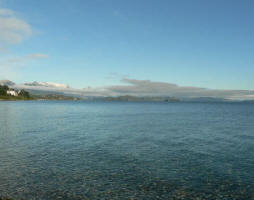 Adaptation to a Changing Climate in the Arab Countries - MNA Flagship Report
Adaptation to a Changing Climate in the Arab Countries - MNA Flagship Report
While the people in the Middle East and North Africa (MENA) have been coping with a harsh environment for thousands of years, climate change offers unprecedented challenges. With rapid climate change existing coping mechanisms are often becoming inadequate or obsolete; hence climate change impacts negatively on people’s lives and livelihood. Solutions to reduce vulnerability and capitalize on opportunities are presently difficult for policy makers in the region to identify and implement. This has motivated the World Bank and the League of Arab states to produce the flagship report: Adaptation to a Changing Climate in the Arab Countries.
The objective is to provide information on current and future climate variability and change and provide actions and policy recommendations that can improve people's lives and livelihood in a changing climate.
Thousands of people throughout the Arab world are being impacted by climate change through increased cyclones, floods, and multi-year and recurrent droughts. In Syria more than 250,000 families have left the arid rural areas after their assets, including livestock, have been slowly and steadily depleted.
Some decades ago pastoralist such as the Bedu could move to new areas where they could find grass and water to feed their livestock. Now with growing populations, borders and property rights it is often difficult, if not impossible to move to where the grass is greener. Instead, livestock often succumbs to drought and the only option is to move to the outskirts of towns and cities where the pastoral way of life so critical the Bedu culture is lost, assets are depleted and the skills of the rural poor are hard to deploy. With few assets and often with few social networks, they have limited capacity to adapt and face enormous hardship.
Another example of such hardship is the current drought in the horn of Africa which has led to migration and depleted heath and caused hunger for thousands of people. Due to the lack of adequate food intake, malnutrition is widespread and people are traveling often far in search not only of new livelihoods but often for survival. This illustrates the hardship climate change is leading to for many people in MENA.
Let us not forget that the poorest in the region are the hardest hit and often the most vulnerable to climate variability and change. This is because poor people are the most dependent on natural resources for their livelihoods and well-being and often live in geographical locations which are particularly vulnerable to climate change such as on steep slopes, in valleys, or in arid areas. With the increased impact of climate change already difficult situations can become life threatening.
It is no secret that it is getting warmer, dryer and more variable in MENA. In 2010 alone four countries in the region logged temperatures above 50 C.
The changing climate impacts people's well-being in a multitude of way. For example: through their livelihoods, health, access to water and assets as well as gender relations in both rural and urban areas. This calls for action and this is what the report is aiming to provide.
The report is being produced by regional and international experts in the above mentioned areas. By making sure that researchers in these countries play a prominent role in the process of producing the report, it is more likely that local knowledge and experience will be captured and options to address the changing climate in the region will be addressed adequately and appropriately for the reality the the people in the region live with today and in the near future.
--
| Report Chapters |
| Full Report |
| Appendices |
| Chapter 1: Climate Change is Happening Now and People Are Affected in Arab Countries |
| Chapter 2: Ways Forward for Climatology |
| Mini-Chapter: Disaster Risk Management |
| Chapter 3: Projected Impacts of Climate Change on Water Resources |
| Chapter 4: Climate Change is a Threat to Food Security and Rural Livelihoods |
| Chapter 5: Urban Livelihoods and Living Conditions are Affected by Climate Change |
| Chapter 6: Gender - Responsive Climate Change Adaptation: Ensuring Effectiveness and Sustainability |
| Chapter 7: Improving Health in a Changing Climate |
|
Chapter 8: Recommended Policy Directions and Adaptation Actions
-- |
| Contact information |
Email: kkatich@worldbank.org ; gmenckfigueroa@worldbank.org ; dverner@worldbank.org |
|---|---|
| News type | Inbrief |
| File link |
http://web.worldbank.org/WBSITE/EXTERNAL/COUNTRIES/MENAEXT/0,,contentMDK:22870566~pagePK:146736~piPK:146830~theSitePK:256299,00.html |
| File link local |
|
| Source of information | World Bank |
| Keyword(s) | Adaptation to Climate Change |
| Subject(s) | HYDRAULICS - HYDROLOGY , INFORMATION - COMPUTER SCIENCES , METHTODOLOGY - STATISTICS - DECISION AID , RISKS AND CLIMATOLOGY , TOOL TERMS |
| Relation | http://www.arabwatercouncil.org/AWF/Downloads/Sessions/Theme2/3-Dorte-CC-Adaptation-Action-Plans.pdf |
| Geographical coverage | n/a |
| News date | 10/02/2012 |
| Working language(s) | ENGLISH |
The team is grateful for the ideas, comments, and contributions provided by the Advisers on this report:
Ibrahim Abdel Gelil (Arabian Gulf University, Bahrain), Rami Abu Salman (IFAD), Emad Adly (RAED, Egypt), Hesham Bassioni (Regional Center for Disaster Risk Reduction, Egypt), Wadid Erian (Arab
Center for Study of Arid Zones and Drylands, Syria), Nadim Khouri (ESCWA, Lebanon), Rami Khouri (Issam Fares Institute, American University Beirut, Lebanon), Karim Makdisi (Issam Fares Institute,
American University Beirut, Lebanon), Mohammed Messouli (University of Marrakech, Morocco), Ziad Mimi (Birzeit University, Palestine), Balgis Osman-Elasha (AfDB, Sudan), Najib Saab (Arab Forum for
Environment and Development- AFED, Lebanon), and Shahira Wahbi (League of Arab States, Egypt).
The team is grateful to the following reviewers for their contributions reflecting global knowledge at the World Bank: Marjory-Anne Bromhead, Nadereh Chamlou, Bekele Debele Negewo, Dan Hoornweg,
Gabriella Izzi, Willem Janssen, Claire Kfouri, Yoshiharu Kobayashi, Julian Lampietti, Qun Li, Banu Setlur, William Sutton, and Andrea Zanon. Additionally, the team is grateful for the contributions of
Hilary Gopnik (Emory University); Jakob Kronik, Noemí Padrón Fumero (Universidad de Las Palmas de Gran Canaria, Spain); Rainer Thiele and Manfred Wiebelt (Kiel Institute for the World Economy -IfW);
Perrihan Al-Riffai, Olivier Ecker, Jose Funes, Gerald Nelson, Ricky Richardson, Richard Robertson, and Tingju Zhu (IFPRI) and Michael Westphal.
The team is grateful for comments, ideas, and contributions received from the following: Yasser Mohammad Abd Al-Rahman (QHSE, Egypt), Shardul Agrawala (OECD),Hala Al-Dosari (Independent Writer, Saudi Arabia), Salahadein Alzien (S.D.C., Libya), Ruby Assad (GIZ Senior Advisor), JoAnn Carmin (MIT), Roshan Cooke (IFAD), Suraje Dessai (University of Exeter), Jauad El Kharraz (EMWIS/Water Information Systems, France), Mohamed Konna El Karim (League of Arab States, Egypt), Bouchta El Moumni (Université A. ESSAÂDI, Morocco), Ahmed Farouk (Center for Development Services, Egypt), Bence Fülöp (Trinity Enviro, Hungary), Benjamin Garnaud (Institut du Développement Durable et des Relations Internationales – IDDRI, France), Brendan Gillespie (OECD),Flora Ijjas (Trinity Enviro, Hungary), Vahakn Kabakian (Government of Lebanon), Jack Kalpakian (Al Akhawayn University Ifrane, Morocco), Dr. Seeme Mallick (ONE UN Joint Programme on Environment, Pakistan), Carla Mellor (ICBA), Amal Mosharrafieh (AFED, Lebanon), Adrian Muller (ETH Zurich, Switzerland), Cristina Narbona (OECD), Frode Neergaard (OECD), Asif Niazi (WFP, Egypt), Michele Nori (Independent Consultant on Agro-pastoral Livelihoods), Remy Paris (OECD), Saloua Rochdane (University of Marrakech, Morocco), Idllalène Samira (Université Cadi Ayyad, Morocco), Nathalie Sulmont (OECD), Rianne C. ten Veen (Islamic Relief Worldwide, UK), Naoufel Telahigue (IFAD), and Samira al-Zoughbi (National Agricultural Policy Center, Syria).The team is grateful to Peer Reviewers Marianne Fay (SDNVP), Erick C.M. Fernandes, (LCSAR), and John Nash (LCSSD). It also gratefully acknowledges helpful comments, ideas, and guidance, from Biesan Abu Kwaik, Hafed Al-Ghwell, Shamshad Akhtar, Sameer Akbar, Anthony Bigio, Franck Bousquet, Kevin Carey, Diana Chung, Luis Constantino, Moira Enerva, Marcos Ghattas, Grace Hemmings-Gapihan, Santiago Herrera, Johanne Holten, Imane Ikkez, Mats Karlsson, Hoonae Kim, Hedi Larbi, Dale Lautenbach, Dahlia Lotayef, Laszlo Lovei, Ida Mori, Thoko Moyo, Alaa Sarhan, Deepali Tewari, and Jonathan Walters.The team would also like to thank Marie-Francoise How Yew Kin, Josephine Onwuemene, Salenna Prince, Indra Raja, and Perry Radford for assisting the team very effectively thoughout the process of the task. Additional thanks go to the country offices‘ staff for their support of our workshop and consultations: Faten Abdulfattah, Rola Assi, Zeina El Khalil, Lana Mourtada, Mohammed A. Sharief, Steve Tinegate, Dany, Hadi (Lebanon); Natalie Abu-Ata, Claire Ciosi, Margarita Gaillochet, Olivier Lavinal, Mona Yafi, and Sabrina Zitouni (Center for Mediterranean Integration - CMI).The World Bank team working on the task includes Kristina Katich, Andrew Losos, Grace Menck Figueroa, Ian Noble, and Sanne Tikjøb.
Posted by jauad at 10 Feb 2012 12:19:33
 you are not logged in
you are not logged in





